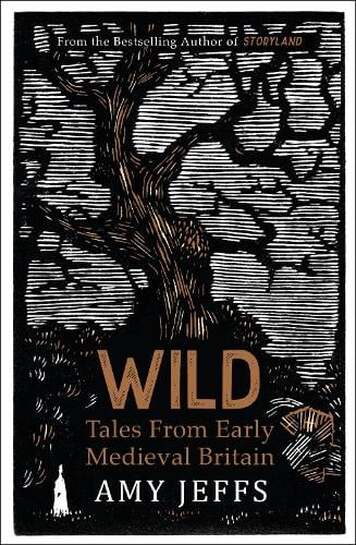
TITLE: Wild
AUTHOR: Amy Jeffs
PUBLISHER: Quercus
ISBN: 9781529424263
PODCAST EPISODE: Episode 128
REVIEWER: Hilary Wilson
Most listeners to The Folklore Podcast will be familiar with Dr. Amy Jeffs’ brilliance. Art historian, artist, and regular contributor to Country Life Magazine, Jeffs is a multifaceted individual, who pairs her linocut and wood-engraving artwork with her historically inspired writing. Her previous book Storyland, which focused upon the history and legends of the United Kingdom and Ireland as a whole, was covered in Season 7, Episode 108 of The Folklore Podcast. Wild: Tales From Early Medieval Britain, her new book published by Quercus Publishing, focuses not upon the history of the founding of Britain, but rather upon the life experience and mentality of those living there.
Jeffs’ writing shows the reader that the abstract notion of the Wild, ever present to the medieval mind, is still accessible in the modern day. While people may no longer view the ocean as the “restlessness” that the early medieval folk thought of it as, the wandering seafarer remains a familiar figure throughout literature to this day. Similarly, the contemporary climate crisis echoes the experience of Lindisfarne before the Vikings invaded. Most now see us as living on the precipice of Doomsday. Jeffs ventures to show the reader a way to live upon that cliff’s edge with grace and perhaps even joy, through the celebration of unity that the monks used to create some of the most beautiful art of all ages.
The seven chapters of the book each focus upon a theme: Earth, Ocean, Forest, Beast, Fen, Catastrophe, and Paradise. The chapters open with a reimagining of a poem or riddle from the Exeter Book, and end with the author’s reflections upon what was just written. While the writings are beautiful, they also add enough to the writing itself that I was tempted to reread and capture what I had missed the first time around.
At first blush these stories seem as dense and foreign as an old growth forest is to modern eyes. By the end of the book, however, the beauty in the “wayless” wild is clear, much like the flight patterns of birds. Jeffs explains the fabricated etymology of the word avian that Isidore of Seville provided in his Etymologiae. Via being Latin for road or path, meant that avia described the “wayless” flight of the birds around them. This book is like a murmuration of starlings, perhaps - “wayless” in flight patterns governed by little rhyme or reason that most could discern - a conglomeration of voices of the past from the Exeter Book and other medieval sources, coming together to create something new and beautiful.
AUTHOR: Amy Jeffs
PUBLISHER: Quercus
ISBN: 9781529424263
PODCAST EPISODE: Episode 128
REVIEWER: Hilary Wilson
Most listeners to The Folklore Podcast will be familiar with Dr. Amy Jeffs’ brilliance. Art historian, artist, and regular contributor to Country Life Magazine, Jeffs is a multifaceted individual, who pairs her linocut and wood-engraving artwork with her historically inspired writing. Her previous book Storyland, which focused upon the history and legends of the United Kingdom and Ireland as a whole, was covered in Season 7, Episode 108 of The Folklore Podcast. Wild: Tales From Early Medieval Britain, her new book published by Quercus Publishing, focuses not upon the history of the founding of Britain, but rather upon the life experience and mentality of those living there.
Jeffs’ writing shows the reader that the abstract notion of the Wild, ever present to the medieval mind, is still accessible in the modern day. While people may no longer view the ocean as the “restlessness” that the early medieval folk thought of it as, the wandering seafarer remains a familiar figure throughout literature to this day. Similarly, the contemporary climate crisis echoes the experience of Lindisfarne before the Vikings invaded. Most now see us as living on the precipice of Doomsday. Jeffs ventures to show the reader a way to live upon that cliff’s edge with grace and perhaps even joy, through the celebration of unity that the monks used to create some of the most beautiful art of all ages.
The seven chapters of the book each focus upon a theme: Earth, Ocean, Forest, Beast, Fen, Catastrophe, and Paradise. The chapters open with a reimagining of a poem or riddle from the Exeter Book, and end with the author’s reflections upon what was just written. While the writings are beautiful, they also add enough to the writing itself that I was tempted to reread and capture what I had missed the first time around.
At first blush these stories seem as dense and foreign as an old growth forest is to modern eyes. By the end of the book, however, the beauty in the “wayless” wild is clear, much like the flight patterns of birds. Jeffs explains the fabricated etymology of the word avian that Isidore of Seville provided in his Etymologiae. Via being Latin for road or path, meant that avia described the “wayless” flight of the birds around them. This book is like a murmuration of starlings, perhaps - “wayless” in flight patterns governed by little rhyme or reason that most could discern - a conglomeration of voices of the past from the Exeter Book and other medieval sources, coming together to create something new and beautiful.